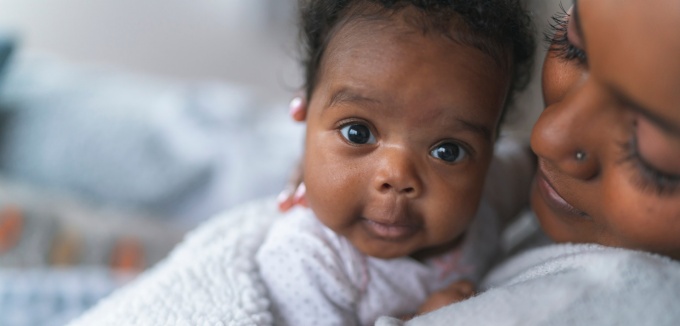Why we need more perinatal social workers

By Matthew Biddle
Mallory Ferland, MSW ’22, has stood beside new parents at the worst moment of their lives.
Before coming to the UB School of Social Work, she volunteered with Now I Lay Me Down to Sleep, a nonprofit that helps parents heal after the loss of a baby.
“It was my first experience working directly with social workers,” she says. “I realized I wanted to do more with the birthing population, and that’s ultimately why I joined UB’s social work program.”
For her advanced year field placement, Ferland interned with WNY Postpartum Connection (WNYPPC), a volunteer-run nonprofit that aims to improve access to perinatal mental health services.
Founded by three social workers, WNYPPC began as a resource directory in 2017; now, it helps link people to support groups, hosts community events and has built an extensive network of therapists and providers. When individuals reach out for support, the organization taps into that network to find a provider who can assist.
“When you’re in the throes of postpartum depression, making several phone calls can be really hard,” says Jennifer Urban, co-founder and co-director of WNYPPC, and a field educator and liaison for the School of Social Work. “We try to remove that barrier with a simple contact form, where someone can say, ‘I need help.’ We respond and engage with our network to connect them with a provider.”

Ferland
WNYPPC represents a major leap forward for perinatal mental health care access in Western New York— but gaps remain, both locally and nationally. There are too few Black and Indigenous providers. Services are limited for dads and anyone living in rural or low-income communities. Ferland often struggled to find providers that accept Medicaid or specific types of insurance.
“Birthing people make up about 50% of our population, yet their experiences and needs are often overlooked — and that’s intertwined with reproductive justice and many other aspects of social work,” Ferland says.
Urban agrees: “We know there are health disparities, and there’s often a lack of trust in the mental health system. We need to build those relationships — build that trust — so people know help is available and they’re not alone.”
— Jennifer Urban, Co-Founder and Co-Director, WNY Postpartum Connection; Field Educator and Liaison, UB School of Social Work
The Maternal Health Crisis
According to the National Center for Health Statistics, U.S. maternal mortality rates surged 40% in 2021, partly because of COVID-19. The U.S. far exceeds other developed nations in maternal mortality — with stark racial disparities. Black women are three times more likely to die from pregnancy-related causes than white women.
In the White House’s “Blueprint for Addressing the Maternal Health Crisis,” Vice President Kamala Harris wrote: “Far too many women experience pain, neglect and loss during what should be one of the most joyous times of their lives.” The document also acknowledged the key role that various providers play in the maternal health ecosystem — including social workers.
“Historically, social work had always done a lot with maternal and child health, but over the last 30 years, fewer and fewer social workers have been going into perinatal social work,” says Robert Keefe, associate professor of social work.
“Social workers are trained to work in communities and systems of all sizes,” Keefe continues. “As one mother told me, ‘You can give me all the medication in the world — it’s not going to stop the gunshots outside my apartment.’ Without social workers, no one’s addressing the environment where these mothers live and raise their children.”

Keefe
Keefe studies factors that lead to negative birth outcomes and works to improve the delivery of health care services, particularly to mothers of color. In one stream of research, Keefe heard a common refrain from low-income mothers with postpartum depression: “We don’t have time to be depressed.”
“That’s a powerful statement,” Keefe says. “But research tells us that mothers will make sure their kids health is better taken care of than their own health, so we’ve been working with community health workers in WIC clinics, pediatrician offices and other agencies to provide services for mothers too.”
To integrate social work more into perinatal care, Keefe has been working to forge ties with other professions through his involvement with the American Public Health Association. In another positive development, he sees more mothers coming forward to share their mental health struggles and reduce the stigma around postpartum depression.
“Many women assume what they’re going through is a normal part of motherhood, as opposed to something that has adverse consequences on themselves and their children,” he says. “We’re beginning to see mothers acknowledge their experiences more. Instead of remaining isolated, they’ll reach out to one another for concrete needs — like a ride to an appointment — and lift one another up.”
Engaging Dads

The Buffalo Fatherhood Initiative is working to build that same sense of community among dads.
Research shows paternal involvement significantly impacts perinatal outcomes, including reducing negative maternal health behaviors and lowering the risks of preterm birth, low birth weight, fetal growth restriction and infant mortality up to one year after birth. Conversely, infant mortality rates can be up to four times higher when fathers are absent during pregnancy.
Part of the Buffalo Prenatal Perinatal Network (BPPN), the initiative encompasses three programs, including school-based opportunities and a personal finance program in partnership with Say Yes Buffalo.
Another program, called Nurturing Fathers, facilitates authentic conversations among participants and uses an evidence-based curriculum to help men develop skills, gain confidence as dads and build healthy relationships with their kids and partners.

St. Vil
“We’re in a society that sort of leaves fathers out, and the root of that is an expectation that fathers don’t care and aren’t involved,” says Christopher St. Vil, assistant professor of social work, who has worked with the program since its inception. “BPPN is trying to change society’s views and help fathers learn that if they get past these stereotypes and engage with their children, their entire family fares better.”
The organization has hosted multiple MSW student interns, who assist with surveys and focus groups, client intake and program operations.
“One outcome we’re seeing is less household conflict,” says Antoine Johnson, Buffalo Fatherhood Initiative program manager. “In focus groups, guys talk about how they become better communicators with their partners and kids. There’s a lot of growth and maturity that happens as the guys bond and learn from the program.”
Moving forward, research shows that when fathers are involved in their kids’ lives, high school graduation and postsecondary education rates increase.
“There’s a role for social work here because a lot of dads want to be involved, but don’t know how some of the things they do influence the child’s development,” St. Vil says. “This is where social workers can help men to play outside of these gender roles and feel comfortable engaging in different activities.”
— Mickey Sperlich, PhD, Assistant Professor, UB School of Social Work
Survivor Moms
For individuals with a history of trauma, perinatal social workers can be critical in helping them navigate their pregnancy, birth and postnatal periods. Often, social workers are embedded within clinics, ready to address mental health challenges as they arise.
“Pregnancy can trigger past trauma because so much of the experience of maternity care maps onto past psychosexual experiences survivors have,” says Mickey Sperlich, an assistant professor who teaches an innovative course in infant mental health. “Pregnancy can magnify things like post-traumatic stress, depression and anxiety, so a social worker would help identify those triggers and come up with plans to cope.”
Sperlich continues: “Right now, there’s an emphasis in research on birth trauma, or the birth itself being a traumatic experience. My research shows that people who have PTSD have a higher risk of experiencing birth as traumatic. More than that, many people report medical mistreatment during pregnancy. It’s a wake-up call to perinatal providers that we need to do better.”

Sperlich
Right now, Sperlich is training agencies on an intervention she co-created called the Survivor Moms’ Companion, which helps clients understand how trauma influences their well-being during pregnancy and teaches them how to advocate for themselves and navigate their maternity care experience. Sperlich recently pivoted to gun violence research as well, as new reports point to homicide and suicide as top drivers of maternal mortality.
Sperlich says more programs are needed to address health disparities in perinatal care, especially the racism that undergirds the experiences of Black women, who report being ignored or mistreated more than their white counterparts.
“We need more perinatal social workers and infant mental health specialists, and more screenings and interventions they can employ. We need to do more to translate trauma-informed and anti-racist principles into the perinatal space,” she says. “Nothing matters more to a child’s life than their parents’ mental health and well-being.”
Do you work in a perinatal or related setting? Partner with us to host MSW student interns. For more information, contact our Field Education Office at sw-field@buffalo.edu.